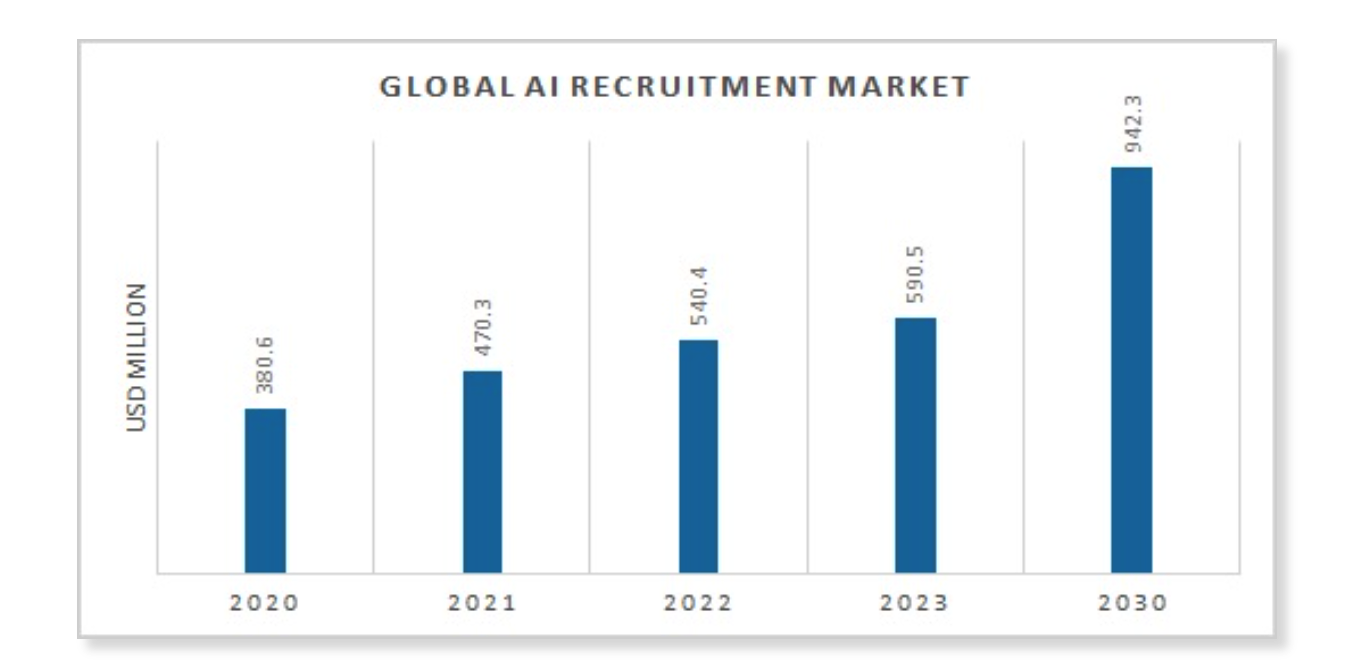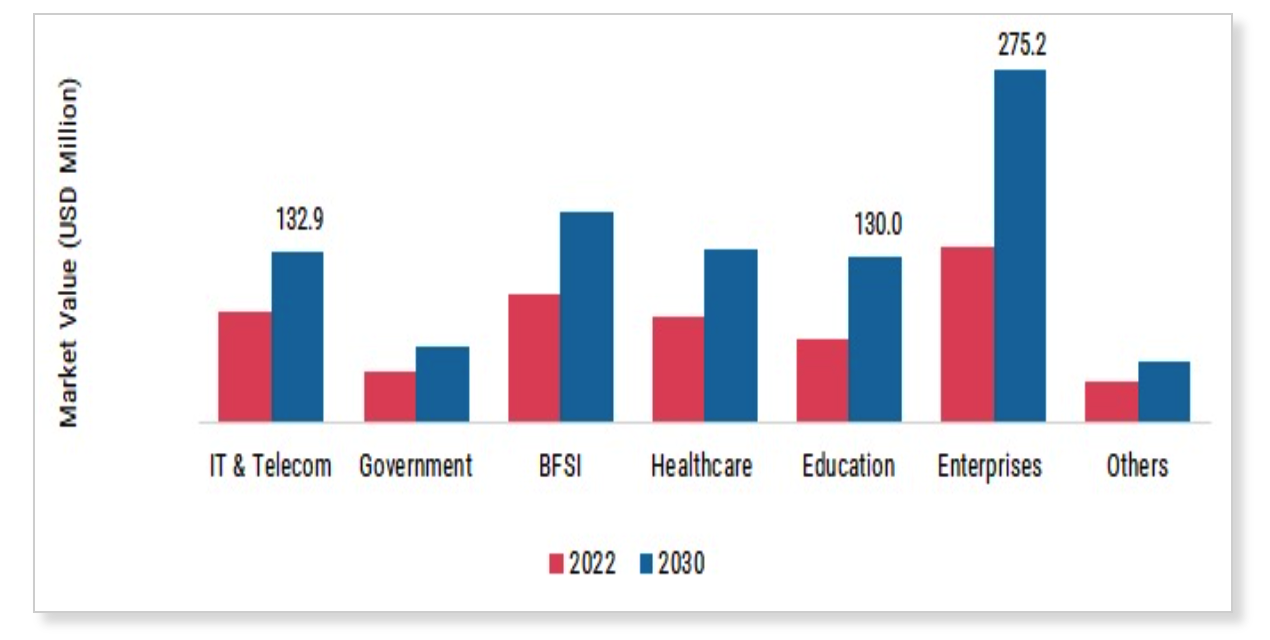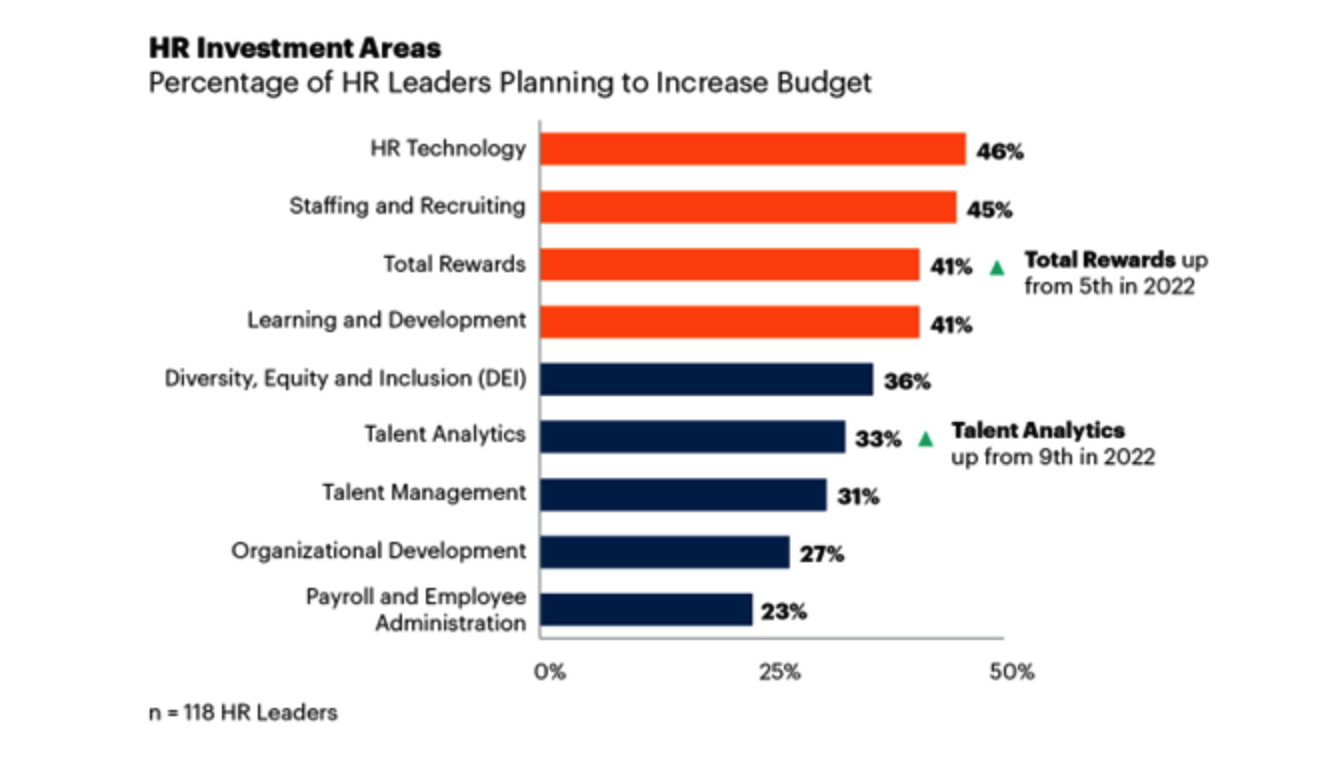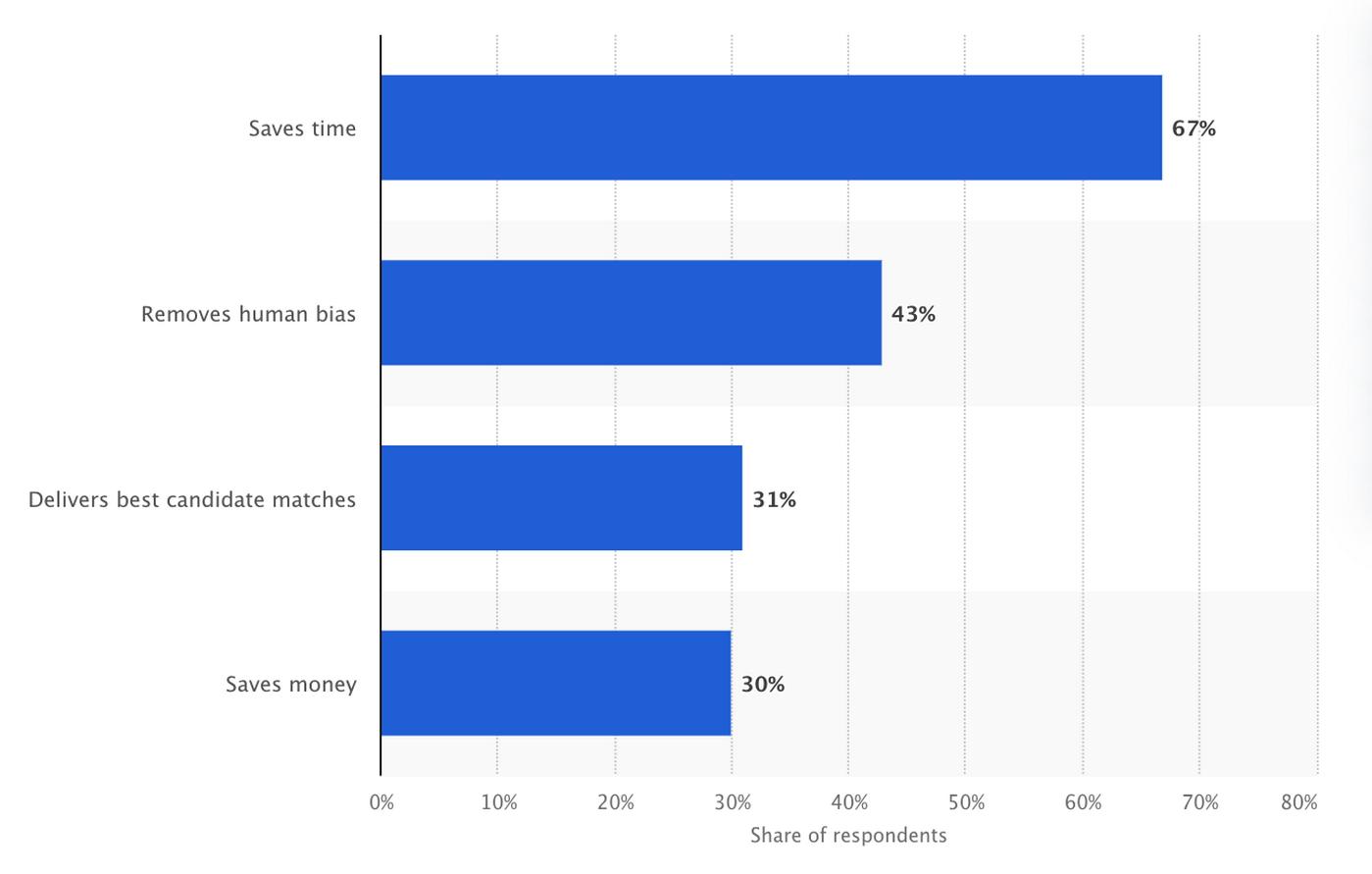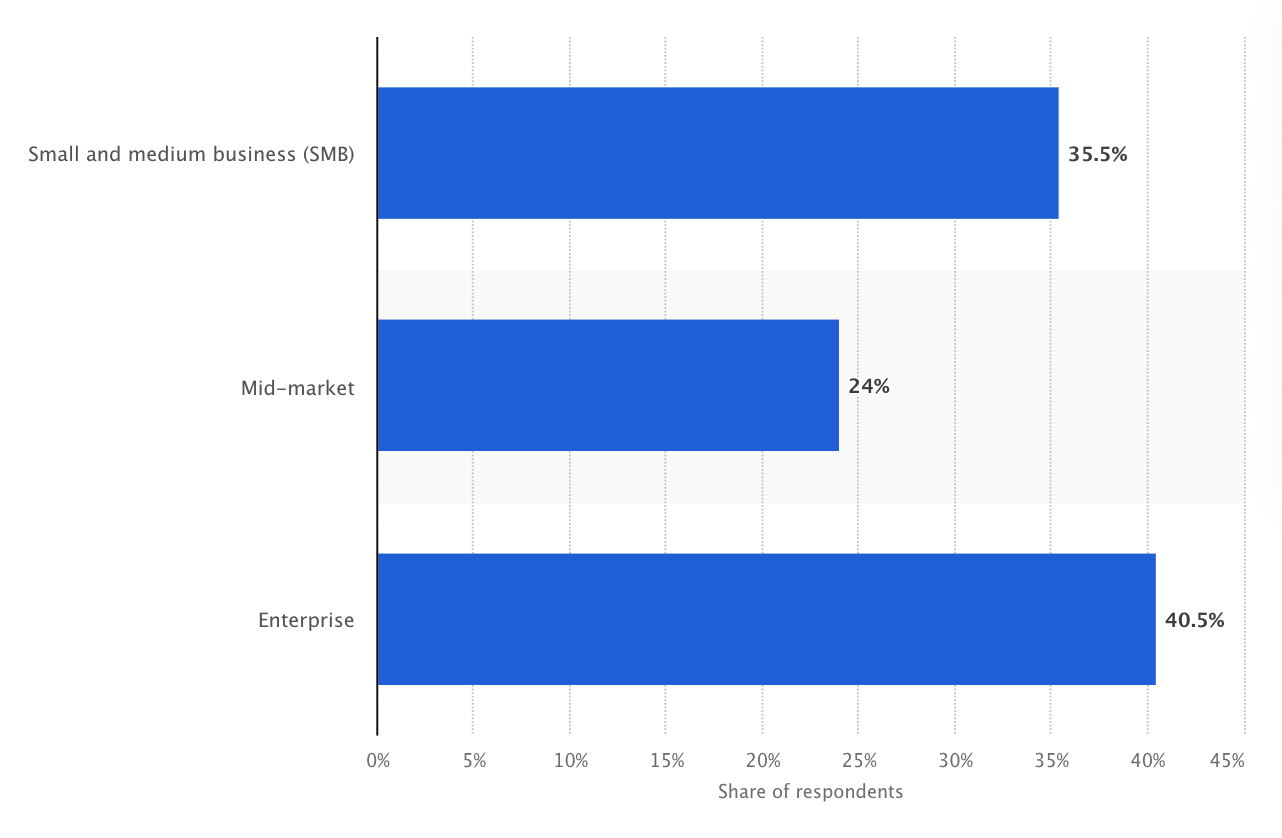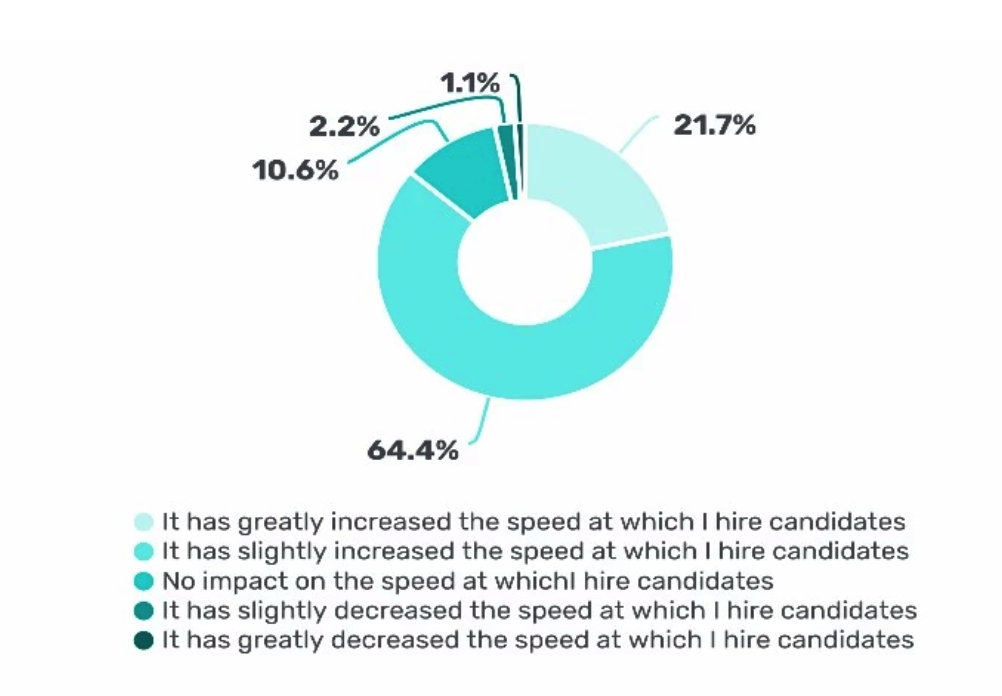47 Top AI in Recruitment Statistics for 2024
AI plays a key part in the hiring process, assisting recruiters in sorting through thousands of CVs to find the best applicant and automating manual processes that would normally be required.
But how exactly can AI impact recruitment? What role does artificial intelligence play in the hiring of ideal candidates?
Let’s have a look at the AI in recruitment statistics on the tremendous impact that this rapidly growing technology has had on recruiting, as well as the enormous significance it has had in terms of the automation of manual processes.
- , AI
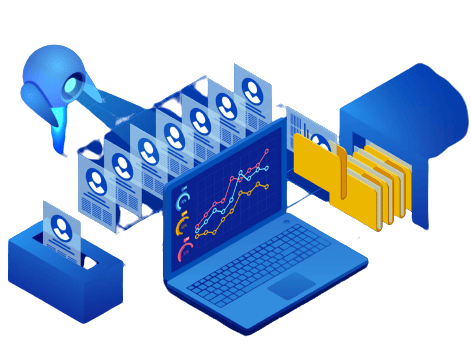
Top AI Statistics in Recruitment
- 24% of companies utilize AI to hire talented employees.
- According to a poll, 86.1% of recruiters, using AI technology have sped up the hiring process.
- 68% of recruiters think the use of AI in the recruiting process will eliminate unintended bias.
- Overwhelmingly, 89% of HR professionals believe that AI will improve the applicant application process.
- The majority of businesses, 92% of which are luxury labels, claim they use or are utilizing recruiting tools.
- More than 90% of individuals believe that some kind of manipulation is possible with artificial intelligence. Only 9% of individuals think AI is sophisticated enough to be unmanipulated.
- AI is reportedly used in the hiring process by 65% of recruiters.
- Only approximately 7% of people would be unhappy if they were recruited by AI instead of a person, and 76% would be OK with it.
- More than 87% of individuals believe that AI is more helpful for hiring in certain industries than in others.
- According to 35% of talent experts and recruiting managers, AI in talent recruitment is the most important development influencing how they hire.
- Only 10% of businesses now use AI to find applicants, while 36% want to automate their hiring procedures using AI ML in the next two years, based on a Carmichael Fisher survey.
- HR managers waste fourteen hours a week on repetitive duties that can be automated.
- An expanding IT business saw a 66% reduction in processing time when it used automation to screen offer letters for accuracy, freeing up four workers’ time for more important tasks.
- According to 45% of HR professionals, automation will improve their work in the future, particularly in the area of recruitment.
- 25% of businesses say they use HR automation, mostly for recruiting and hiring.
- If automation is used in the hiring process, as noted by 69% of HR professionals, the time spent on the process is greatly reduced.
- Merely 40% of businesses that utilize HR automation for hiring said that their software provider was open about how their system addresses biases.
- Hilton used AI in hiring, boosting talent acquisition by 40% and cutting vacancy replacement times by 90%.
- 41% of businesses interact with candidates during the hiring process using AI chatbots.
- The expense per screening candidate has decreased by 75% for early users of AI recruitment.
- Of the businesses that successfully used AI for HR functions like hiring, 41% cite strong HR and IT cooperation as a key factor in their success.
- China is expected to dominate the Asia-Pacific AI recruiting industry in 2023, with a market value of around $400 million. With a $323.2 million contribution to the market value, North America trails closely behind.
- Poor interviews result in 45% of job rejections, and 46% of new hires underperform, driving businesses to consider AI as a valuable recruitment solution.
- Over 78% of recruiters believe that using an ATS machine raises the calibre of prospects hired.
- 63% of hiring professionals think AI can take on the role of applicant screening.
- AI might help candidates during the application process, according to 95% of HR respondents.
- According to 68% of recruiters, AI will aid in eliminating bias from the hiring process.
- 40% of respondents feel that their AI vendors are transparent about how their products mitigate or minimize biases.
- 20% of black Americans believe that hiring AI will worsen racial bias.
- Americans think AI would struggle to identify a candidate’s social suitability, with 43% believing it would be worse than humans and only 17% considering it better.
- Only 3% of professionals working in University Relations and Recruiting (URR) want to use artificial intelligence.
- Senior HR professionals generally agree that three years is required to successfully adopt AI.
- According to 71% of hiring teams, managing data requires intelligent technologies.
- AI in talent acquisition is viewed as a positive idea by 92% of HR professionals.
- A third of companies employ AI in their hiring processes.
- AI is already used by 65% of recruiters.
- In a poll, nearly 60% of respondents claimed that their companies were already utilizing AI to manage talent.
- More than a hundred startups are already developing AI tech solutions specifically for HR managers.
- According to 35% of talent managers and hiring specialists, AI has the biggest impact on their hiring procedures.
- Approximately 85% of recruiters believe AI will play a role in hiring and be useful.
- Around 67% of HR executives think AI is helpful for various aspects of the hiring process.
- 58% of recruiters say AI has been the most helpful in terms of finding applicants.
- Additionally, 56% of respondents believe AI is most useful for applicant screening, while 55% believe it is most useful for candidate nurturing.
- Approximately 89% of those surveyed think AI could help candidates with their application.
- A survey conducted by LinkedIn questioned recruitment managers and found that 67% of them believe AI helps them save time.
- The use of artificial intelligence (AI) in human resources procedures is seen as beneficial to the organization by 45% of those who participated in the survey.
- Companies who employ AI for recruitment have the ability to minimize attrition by 35% and cut their cost-per-screen expenses by 75%.
Market Size of AI in Recruitment
From challenging capacities to integrating new programs and optimizing procedures, AI has the potential to have a tremendous influence on the recruiting business.
In general, it strives to bring together human and artificial intelligence in order to advance the cause of development. And because of this, the “AI Recruitment Market” is anticipated to expand significantly between 2023 and 2028.
By 2028, it is predicted that the market size for AI recruiting will increase to USD 890.51 million (Facts & Factors)
Facts and Factors projects that the value of the worldwide AI recruiting market will rise from USD 610.3 million in 2021 to USD 890.5 million in 2028, expanding at a CAGR of almost 6.5% during the forecast period.
The industry for AI recruiting is expected to continue growing at a compound annual growth rate (CAGR) of 6.9%, from USD 590.5 million in 2023 to USD 942.3 million by 2030 (Market Research Future)
In 2022, the size of the market for AI recruiting was evaluated at 540.4 million USD. Whereas, the artificial intelligence recruitment market industry is predicted to increase from $590.5 million in 2023 to $942.3 million by 2030, demonstrating a compound yearly growth rate (CAGR) of 6.9% over the course of the forecast period of 2023–2030.
Enterprise Growth Trends in the AI Recruitment Market
In the AI recruitment market, the enterprise sector dominates with the largest market share and a projected 9.14% CAGR (Market Research Future)
The AI recruitment market, segmented by vertical types, reveals the enterprise sector as the predominant influencer, holding the largest market share. Projections indicate an impressive 9.14% CAGR for the enterprise segment throughout the forecast period. Specifically, manufacturing, trading, and packaging industries within the enterprise sector showcase a notable reliance on AI for optimizing their recruitment processes. This highlights the transformative role of AI in reshaping talent acquisition within enterprises.
Global Adoption of AI in Recruitment
Around the world, more and more companies are using AI for hiring. This means they’re using smart computer programs to help find the best people for jobs. It’s like having a high-tech assistant to make hiring faster and better.
AI is used in HR, which includes recruitment, by 88% of businesses worldwide (Society of Human Resources Management)
Although generative AI is quite popular right now, the HR sector is actually not new to this technology. The Society of Human Resources Management reports that 88% of companies globally use AI-powered technologies for their HR procedures.
AI’s Growing Trend in Recruitment
Artificial Intelligence (AI) is becoming a big deal in hiring! More and more companies are using AI to help find the right people for jobs. Let’s explore how AI is changing the way recruiters recruit and hire.
According to 46% of HR executives, investing in new technology, particularly AI, is the top priority for 2023 (Gartner)
In the rapidly evolving landscape of human resource management, the latest insights from Gartner indicate a pivotal shift in priorities among HR executives. According to their findings, a substantial 46% of HR executives are placing a significant emphasis on investing in new technology for the year 2023, with a specific focus on the integration of Artificial Intelligence (AI).
Currently, 30% of organizations screen applicants with algorithms as part of the hiring process; 40% intend to do so within the next year (Mercer)
In the present scenario, 30% of companies have incorporated algorithms into their recruitment processes. These algorithms, essentially computer programs, are utilized to analyze and screen candidates effectively. What’s noteworthy is that an additional 40% of firms are actively considering the implementation of such algorithms in their hiring procedures within the upcoming year. This suggests a growing trend towards leveraging technology to streamline and enhance the candidate selection process.
AI is used by 44% of companies to evaluate applicants based on online data from social media and other sources (Mercer)
In the hiring landscape, 44% of companies are leveraging the power of Artificial Intelligence (AI) to strategically filter and identify the best candidates. This involves the analysis of publicly available information on the internet, particularly from sources like social media profiles. By employing AI in this screening process, these companies aim to enhance the efficiency of candidate evaluation and selection, showcasing a contemporary approach to talent acquisition that harnesses technology for more informed decision-making.
The Importance of AI in Recruitment
AI in recruitment is a game-changer that brings a lot of benefits to the hiring process. It’s like having a super-smart helper that quickly finds the perfect match between job openings and candidates. It speeds up the process, spots hidden talents, and makes hiring more efficient for everyone.
93% of millennials surveyed believed a company’s use of modern technology played a significant role in their decision to accept or decline a job offer (SurveyMonkey)
In a survey where over 1,000 millennials were asked, 93% mentioned that it’s really important for a company to have the latest technology, including AI, when they’re deciding whether to accept or turn down a job offer. This shows how much importance millennials place on working for tech-savvy companies.
46% of HR leaders reported that the most important thing right now is HR technology (Gartner)
According to the findings of a survey conducted by Gartner in October 2022 with 118 HR leaders, the top investment areas for HR leaders in 2023 are hiring and staffing, total compensation, and development and learning.
Where is AI Used in Recruitment?
How can recruiters discover methods to make their lives simpler and their duties more bearable when there are so many people vying for a much smaller number of positions? Artificial intelligence (AI) has the potential to be useful in situations like these.
In the process of recruiting new employees, 58% of recruiters that use AI have found that it is most useful for sourcing candidates (LinkedIn)
58% of the recruiters who used AI in the recruiting process found that it was most helpful with sourcing candidates; 56% of the recruiters who used AI in hiring found that it was most advantageous in Screening Candidates; and 55% of the recruiters who used AI in the recruiting process found that it was most beneficial in Nurturing Candidates.
How is Artificial Intelligence Used in Recruitment?
Automation made possible by AI helps recruiters to shift their focus to the applicant and reduces the potential for bias in the hiring process. They are able to improve the quality of their recruiting decisions by looking at massive data collections from the talent market and maintaining regular communication with prospects. Because of this, employers are now able to more accurately represent applicants.
92% of human resource professionals want to use AI in the process of talent acquisition (eightfold.ai)
According to a recent study conducted by Eightfold AI, change agents in HR are increasingly embracing the potential of AI to help them make better-informed personnel choices at scale. In point of fact, 92 percent of businesses have plans to expand their use of AI in at least one sector of human resources (HR), which may include recruiting process, management procedures, the processing of payments, and the onboarding of newbies.
See also our latest AI in business statistics.
HR executives are using artificial intelligence in:

The goal of 56% of businesses utilizing AI for HR is to automate tedious work (Gartner)
A substantial 56% of companies that have integrated AI into their human resources practices are directing their efforts towards the automation of repetitive tasks.
This implies that these organizations are leveraging artificial intelligence to handle routine and monotonous aspects of HR operations, freeing up valuable time and resources.
By automating tasks like data entry, scheduling, and other repetitive processes, these companies aim to enhance efficiency, reduce manual workload, and allow HR professionals to focus on more strategic and complex aspects of talent management.
Benefits of AI in Recruiting
AI is an investment that not only provides a great value but has minimal ongoing costs. It is powered by algorithm-based programming that can be tailored to aid recruiters in meeting the high recruiting needs of their respective firms.
According to 67% of hiring professionals, the main advantage of employing AI is time savings (Statista)
Saving time is considered the primary advantage of utilizing AI for recruitment purposes by 67% of those who make hiring decisions. In addition to this, it can help eliminate prejudices, save money, and locate the best applicants.
|
Types of Benefits |
Share of Respondents |
|
Saves time |
67% |
|
Removes human bias |
43% |
|
Delivers best candidate matches |
31% |
|
Saves money |
30% |
Businesses that switched to HR automation systems claimed to have saved 90% of their time on administrative work (Nucleus Research)
When companies switched to using HR automation systems, they found that they saved a lot of time—specifically, a whopping 90% less time spent on administrative tasks. This means less effort on routine paperwork and more time for important things.
Almost 67% of HR experts think AI has several advantages and a beneficial effect on the hiring process (Tidio)
Individuals believe that artificial intelligence will save the recruiter’s time, making it simpler for the recruiter to do their work and give significant insights throughout the recruiting process.
42% of recruiters believe that artificial intelligence will make it possible for them to work more strategically (Aptitude Research)
Artificial intelligence doesn’t appear to be a concern for recruiters anymore (AI). According to the report, 42% of recruiters think AI will enable them to operate more strategically. According to this survey, recruiters are adopting AI. It makes them more effective and enhances the applicant’s experience.

Challenges of AI in Recruitment
Navigating the world of Artificial Intelligence in recruitment comes with its own set of challenges. As companies increasingly turn to AI to streamline their hiring processes, some concerns and obstacles need careful consideration.
Understanding and addressing these challenges is crucial for ensuring a fair and effective recruitment landscape. From potential biases in algorithms to the need for human touch in decision-making. Let’s explore some of the key hurdles that arise in the realm of AI in recruitment.
54% of businesses that use HR automation for hiring have encountered issues with the technologies, such as eligible candidates being inadvertently excluded by the algorithms (SHRM)
For companies utilizing HR automation in their hiring processes, 54% have encountered challenges with the tools. These difficulties include instances where the algorithms mistakenly excluded candidates who were actually qualified for the positions. This highlights a noteworthy issue in the effective implementation of HR automation, emphasizing the importance of refining these tools to ensure accurate candidate evaluations and a more seamless recruitment experience.
According to 35% of hiring managers, AI can overlook exceptional and distinctive talent (HRMorning)
About 35% of recruiters worry that AI might miss out on finding unique and unconventional talent, highlighting a concern that automated systems may not fully recognize valuable qualities and skills in candidates.
Candidates oppose the 79% of recruiters who believe AI will be advanced enough to make complete hiring and firing decisions (Tidio)
In a survey of more than 10,000 recruiters, 79% predicted that AI would advance to the point where it could independently select and reject candidates in addition to screening them; candidates, on the other hand, agreed less strongly—43 percent. Furthermore, 69% of applicants say they would feel uneasy if AI made all of the employment decisions.
22% of HR employees fear losing essential human interactions due to AI in HR tasks (Mercer)
As HR tasks go online with AI automation, 22% of HR employees fear losing essential human interactions, raising concerns about a soulless workplace and the risk of missing valuable human connections in candidate selection.
AI’s Expected Impact on Recruitment
Artificial Intelligence (AI) is changing the way companies find and hire new employees. AI’s impact on recruitment is expected to be significant, as it introduces innovative tools and processes to streamline and enhance the hiring process. Let’s explore how AI is shaping the future of recruitment.
In a Yoho survey, 99% of UK HR managers expect AI to boost workplace benefits like better decision-making (32%), increased productivity (30%), task automation (30%), and enhanced innovation (30%) (People Management)
A Yoho Workplace Strategy survey found that 99% of HR managers and directors in the UK expect AI to have a positive impact on the workplace.
|
Possible Advantages |
Percentage |
|
Improved support for decision-making |
32% |
|
More efficacy and productivity |
30% |
|
Regular task automation |
30% |
|
Improvements in imaginative thinking and creativity |
30% |
Embracing AI in Recruitment
Embracing AI in recruitment is like giving your hiring process a smart upgrade. It’s about using technology to make finding the right people quicker and more efficient.
54% of human resources managers view automation as a tool to help them concentrate their valuable time on more important activities rather than as a threat to their jobs (BOSS Magazine)
Over half of HR professionals, specifically 54%, don’t feel like automation is a threat to their jobs. Instead, they see it as a helpful tool. Automation allows them to spend less time on routine tasks, like paperwork, and focus more on important jobs that require a personal touch, like understanding and supporting employees. So, for these professionals, automation is seen as a way to make their work more meaningful and effective.
While 46% of respondents want resources to identify and address bias when utilizing the tools, 30% of poll respondents feel HR automation helps minimize bias while recruiting (SHRM)
Among survey respondents, 30% acknowledged that HR automation plays a role in mitigating potential bias during their hiring processes. However, a notable 46% expressed the need for additional resources to identify and address any bias that may still exist when using these tools.
This indicates a recognition of the positive impact of HR automation in reducing bias, coupled with a desire for ongoing support and tools to ensure fairness and equity in the recruitment process.
Potential of AI in Recruitment
51% of businesses use automation in an effort to reduce costs (Gartner)
Fifty-one percent of companies are turning to automation to cut costs. This reflects a strategic move to streamline operations, reduce manual effort, and boost overall efficiency. The focus on automation aligns with a broader trend in businesses leveraging technology for both innovation and tangible financial benefits in a competitive landscape.
It is anticipated that 56% of HR tasks can be automated without significantly altering current procedures (McKinsey & Company)
Without making significant changes, automated machines could handle about 56% of the tasks that HR professionals typically perform. This suggests that using technology for routine jobs could free up time for HR professionals to focus on more important and thoughtful work.
The Significance of AI in Corporate Recruitment
Exploring the impact of AI in corporate recruitment is like diving into the future of hiring. Instead of traditional methods, AI brings smart technologies that can analyze resumes, identify the best candidates, and even predict their success in a role.
Enterprises spend the most on AI recruitment, with 40.5%. Smaller businesses follow at 35.5%, and mid-sized companies allocate 24% (Statista)
Large companies are investing significantly in AI recruitment, leading the way with a substantial 40.5% of the budget allocation. Following closely are smaller businesses, which dedicate 35.5% of their resources to AI recruitment tools. Meanwhile, mid-sized companies are also active in adopting this technology, with a noteworthy 24% budget share. This distribution highlights the widespread recognition across different business scales of the value that AI brings to the recruitment process.
|
Types of Companies |
Share of Respondents |
|
Enterprise |
40.5% |
|
Mid-market |
24% |
|
Small and medium businesses |
35.5% |
Impact of AI on Recruitment
AI is revolutionizing the hiring landscape for companies and job seekers alike. Picture having a highly intelligent assistant streamlining the hiring process! That’s the power of AI. By employing cutting-edge technology, AI analyzes information to make swift and efficient decisions about job candidates.
60% of jobs, or at least one-third of their operations, can be automated, resulting in major workplace changes for all workers (McKinsey & Company)
For a considerable 60% of job roles, automation has the potential to handle at least one-third of the tasks involved. This foretells significant changes and transformations in the workplace, impacting workers across various sectors.
According to a U.K. research report, automation eliminated 800,000 jobs while creating 3.5 million new ones (Deloitte)
In the UK, a study found that machines took over about 800,000 jobs. But here’s the interesting part: they also created 3.5 million new jobs. So, while some jobs changed, lots of new ones popped up.
According to 86.1% of hiring managers, the use of ATS machine learning expedites the hiring process (GetApp)
A significant majority of recruiters, precisely 86.1%, are of the belief that employing machine learning within Applicant Tracking Systems (ATS) accelerates the recruitment process, showcasing a widespread acknowledgment of the efficiency gains associated with integrating advanced technologies into the hiring workflow.
Yoho’s research reveals notable HR concerns about AI in the workplace, with 29% actively considering ethical implications (People Management)
The Yoho research indicates significant HR concerns about AI in the workplace, with 29% actively considering the ethical implications. Other top worries include reduced human interaction, overdependence on technology, and concerns about technical functionality, security, and privacy. These concerns highlight the importance of ethical considerations and the careful implementation of AI in HR practices.
|
Top HR Concerns |
Percentage |
|
Potential reduction in human interaction |
30% |
|
Over-reliance on technology |
30% |
|
Issues related to technical functionality |
29% |
|
Security and privacy |
29% |
Future of Artificial Intelligence in Recruitment
It seems that AI HR software is likely to play a significant role in the future of recruitment, which promises to be an interesting development.
According to 84% of corporate executives, artificial intelligence (AI) is the trend that will enable them to maintain their competitiveness and gain an edge in the job market in the future (Forbes)
According to research published by Forbes, business leaders believe that artificial intelligence (AI) is the trend that will help them to retain their competitiveness and acquire an advantage in the job market in the future.
By 2030, there will be 6 million enterprises utilizing recruiting software globally, up from the current use of over 4.8 million (SkyQuest)
Recent research conducted by SkyQuest indicates that demand for recruiting software is on the increase. More than 4.8 million enterprises throughout the world are already making use of recruiting software, and it is anticipated that this figure will rise to 6 million by the year 2030.
AI in Recruitment Final Words
While, Artificial Intelligence is revolutionizing recruitment by making processes more efficient, its adoption is particularly prominent in large businesses, where it’s seen as a valuable tool for tasks like candidate sourcing and screening. AI brings benefits such as time savings, unbiased decision-making, and better matches between candidates and jobs. However, there are concerns about potential biases and the impact on human interactions. Despite these concerns, many HR professionals are open to embracing AI for its potential to enhance talent acquisition. Looking ahead, the future of AI in recruitment appears promising, with an expected increase in its use across various industries.
References
- Staff, V. (2022). Report: 92% of HR leaders plan on using AI to acquire talent. VentureBeat. Retrieved 1 October 2022, from https://venturebeat.com/ai/report-92-of-hr-leaders-plan-on-using-ai-to-acquire-talent/.
- Talent Acquisition. Eightfold. (2022). Retrieved 1 October 2022, from https://eightfold.ai/products/talent-acquisition/.
- Spanjaart, J. (2022). Friday Fact: 73% of companies want to invest more in recruitment technology in 2022. Recruitmenttech.com. Retrieved 1 October 2022, from https://www.recruitmenttech.com/friday-fact-73-of-companies-want-to-invest-more-in-recruitment-technology-in-2022/.
- Lisowski, E. (2022). Artificial intelligence in recruitment – how does it work in HR? (update: September 2021). Addepto. Retrieved 1 October 2022, from https://addepto.com/blog/artificial-intelligence-in-recruitment-how-does-it-work-in-hr/#.
- Stefanowicz, B. (2022). AI Recruitment: The Future of Hiring or HR’s Nightmare?. Tidio. Retrieved 1 October 2022, from https://www.tidio.com/blog/ai-recruitment/.
- Study on Global AI Recruitment Market Size to Hit US$ 890.51 Million, at a CAGR of 6.5% by 2028. Facts and Factors. (2022). Retrieved 1 October 2022, from https://www.fnfresearch.com/news/global-ai-recruitment-market.
- (2022). Retrieved 1 October 2022, from https://www.analyticsinsight.net/how-ai-can-be-time-and-budget-saving-in-recruitment/.
- Case, T. (2021). Covid ‘forced us to be creative’: How AI is being used to recruit and onboard talent. WorkLife. Retrieved 1 October 2022, from https://www.worklife.news/technology/ai-is-being-used-to-recruit-and-onboard-talent/.
- Helfrich, T. (2022). Council Post: How To Scale Your Business With AI. Forbes. Retrieved 1 October 2022, from https://www.forbes.com/sites/forbestechcouncil/2022/03/16/how-to-scale-your-business-with-ai/?sh=20d06f7842bc.
- Global Recruitment Software Market to Hit $3.85 Billion by 2028 | Small Businesses to Offer Lucrative Growth Opportunity While AI to Shape the Future. GlobeNewswire News Room. (2022). Retrieved 1 October 2022, from https://www.globenewswire.com/news-release/2022/08/18/2500871/0/en/Global-Recruitment-Software-Market-to-Hit-3-85-Billion-by-2028-Small-Businesses-to-Offer-Lucrative-Growth-Opportunity-While-AI-to-Shape-the-Future.html.
- The 4 Trends Changing How You Hire in 2018 and Beyond. Linkedin.com. (2018). Retrieved 1 October 2022, from https://www.linkedin.com/business/talent/blog/talent-strategy/trends-shaping-future-of-hiring.
- Brin, D. W. (2019, March 22). Employers embrace artificial intelligence for HR. SHRM. https://www.shrm.org/resourcesandtools/hr-topics/global-hr/pages/employers-embrace-artificial-intelligence-for-hr.aspx
- AI recruitment market size, share, revenue and demand forecast 2030. (n.d.). Market Research Future – Industry Analysis Report, Business Consulting and Research. https://www.marketresearchfuture.com/reports/ai-recruitment-market-8289
- Global talent trends 2022-2023. (n.d.). https://www.mercer.com/en-us/insights/people-strategy/future-of-work/global-talent-trends/
- Jobs lost, jobs gained: What the future of work will mean for jobs, skills, and wages. (2017, November, 28), McKinsey & Company. https://www.mckinsey.com/featured-insights/future-of-work/jobs-lost-jobs-gained-what-the-future-of-work-will-mean-for-jobs-skills-and-wages
- AI in HR: How AI is transforming the future of HR. (n.d.). Gartner. https://www.gartner.com/en/human-resources/topics/artificial-intelligence-in-hr
- 10 candidate sourcing strategies to find top talent. (2023, March 16). Lever. https://www.lever.co/recruiting-resources/articles/candidate-sourcing-strategies/
- Bustamante, M., & Gandhi, N. (2018, February 23). Human resources in the age of automation. McKinsey & Company. https://www.mckinsey.com/capabilities/people-and-organizational-performance/our-insights/the-organization-blog/human-resources-in-the-age-of-automation
- More than half of HR managers say artificial intelligence will become a regular part of HR in next 5 years. (n.d.). Press Room | Career Builder. https://press.careerbuilder.com/2017-05-18-More-Than-Half-of-HR-Managers-Say-Artificial-Intelligence-Will-Become-a-Regular-Part-of-HR-in-Next-5-Years
- Technology and HR – The Trends Transforming the Industry. (n.d.). https://thebossmagazine.com/hr-technology-trends/. https://thebossmagazine.com/hr-technology-trends/
- Maurer, R. (2022, April 26). SHRM research: AI use on the rise, ethics questions remain. SHRM. https://www.shrm.org/resourcesandtools/hr-topics/technology/pages/shrm-research-ai-use-rise-ethics-questions-remain.aspx
Patryk Miszczak


